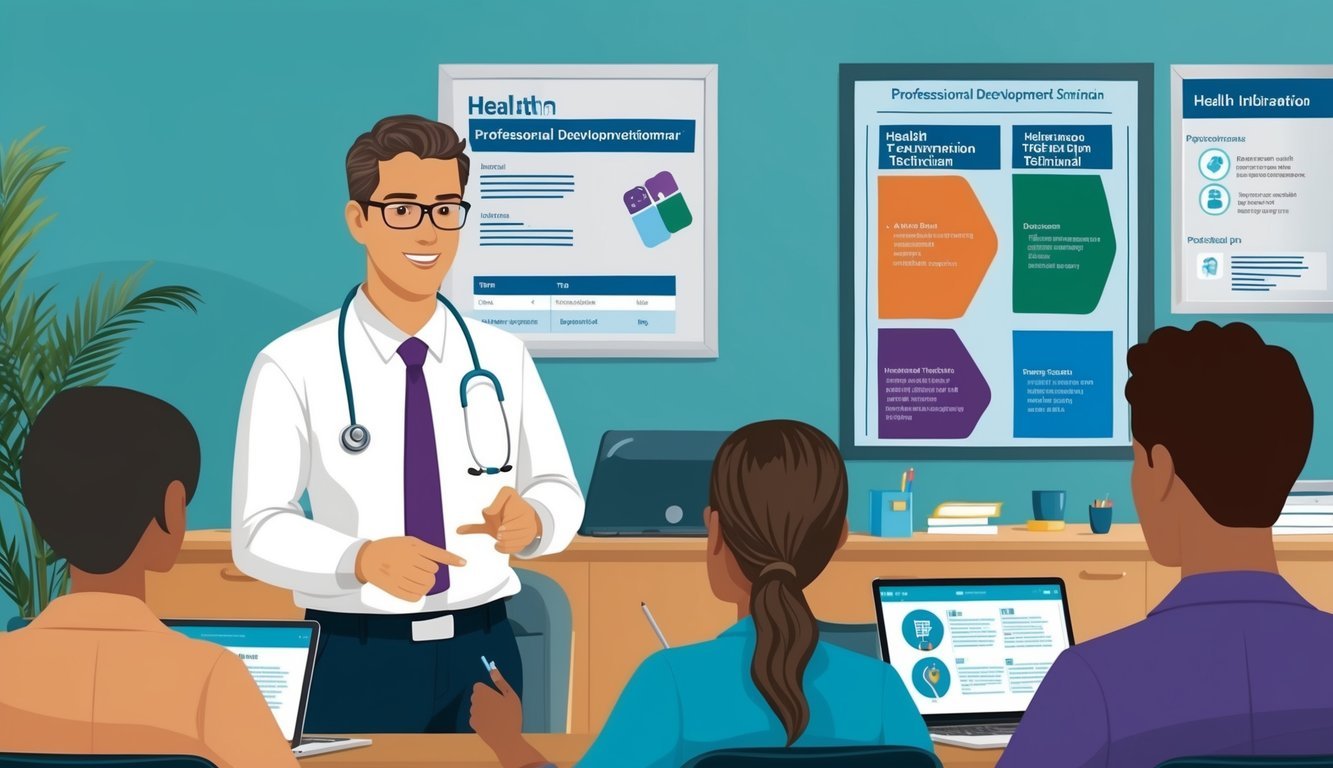Health information technicians play a vital role in managing patient data in various healthcare settings. They ensure that medical records are accurate, secure, and accessible, which directly supports patient care and organizational efficiency. With the increasing reliance on digital records, the demand for skilled technicians continues to rise.
To become a health information technician, a combination of education and certification is often required.
You will find that many technicians hold a degree in health information technology and may pursue certifications like the Registered Health Information Technician (RHIT).
This educational background equips you with essential technical skills and knowledge to succeed in this field.
As you consider this career path, it’s important to recognize the opportunities for growth and development.
The field offers a promising employment outlook, with various pathways for advancement, making it an attractive option for those interested in healthcare and technology.
Key Takeaways
- Health information technicians manage and secure patient data.
- Education and certification open doors to career opportunities.
- The field provides pathways for professional growth and development.
Overview of Health Information Technician Careers
Health information technicians play a critical role in managing patient data and medical records in the healthcare system.
They ensure that healthcare providers have accurate and secure access to important information.
Role and Responsibilities
As a health information technician, your primary duty is to manage and organize medical records.
This includes reviewing, storing, and maintaining patient data.
You will work with both paper and electronic health records (EHRs) to ensure accuracy and compliance.
Your responsibilities also involve protecting patient privacy.
You need to follow laws like HIPAA, which safeguard sensitive medical information.
Additionally, you may prepare records for billing and insurance purposes, ensuring that all data is current and correct.
Key responsibilities include:
- Reviewing patient records for completeness and accuracy
- Organizing data for clinical databases
- Protecting the confidentiality of medical records
You will support healthcare professionals by providing the information they need for quality patient care.
Importance in Healthcare Systems
Health information technicians are vital for the smooth functioning of healthcare systems.
Your work supports clinical decision-making by ensuring that up-to-date patient information is readily available.
Additionally, you contribute to healthcare efficiency.
By maintaining accurate records, you help reduce errors and streamline the billing process.
Proper management of health information allows healthcare facilities to operate more effectively.
Ensuring compliance with regulations also helps healthcare organizations avoid legal issues.
In this role, you play a pivotal part in promoting high standards for patient care through well-managed health information.
Educational Pathways and Certification
To become a health information technician, you need the right educational background and certifications.
This section explores the necessary degrees, the importance of certifications, and the value of continuing education in this field.
Associate and Bachelor’s Degrees
You typically start your journey by earning an Associate Degree in health information technology.
This two-year program provides you with fundamental skills in managing medical records, coding, and compliance.
Many community colleges and some universities offer such programs.
Graduates can pursue jobs as entry-level health information technicians or seek further education.
A Bachelor of Science in Health Information Management is another option.
This four-year degree enhances your knowledge of healthcare systems and prepares you for higher-level positions.
Programs accredited by the Commission on Accreditation for Health Informatics and Information Management (CAHIIM) are widely recognized.
Certifications and Registrations
After completing your degree, obtaining certification is crucial.
The most recognized certification is the Registered Health Information Technician (RHIT) certification.
To earn this certification, you must pass an exam that tests your knowledge of health information management.
Having the RHIT designation shows employers that you are qualified and committed to the profession.
Maintaining this certification requires you to stay current with industry standards and practices.
You may need to complete ongoing education credits periodically to keep your certification active.
Continuing Education
Continuing education is essential in the ever-evolving field of health information technology.
Many employers prefer candidates who stay updated on the latest practices and technologies.
To maintain your RHIT certification, you need to complete continuing education units (CEUs).
These may include workshops, online courses, or attending industry conferences.
You can find various continuing education opportunities through professional organizations like the American Health Information Management Association (AHIMA).
Staying informed helps you advance your career and enhances your skills in health information management.
Technical Skills and Knowledge Base

As a health information technician, you need a strong set of technical skills and a solid knowledge base.
Key areas include medical terminology, data management, and the use of information technology systems.
Medical Terminology and Coding
Understanding medical terminology is crucial for effective communication in healthcare.
You must be familiar with the language used in patient records, diagnoses, and treatment plans.
This knowledge helps you accurately code medical information.
Medical coding involves translating healthcare services and diagnoses into standardized codes.
These codes are essential for billing and insurance purposes.
Familiarity with coding systems, such as CPT (Current Procedural Terminology) and ICD (International Classification of Diseases), is necessary.
Your ability to apply this knowledge ensures compliance with healthcare regulations while promoting accurate reimbursements.
Data Management and Analysis
Data management is a vital skill in your role.
You will organize, store, and retrieve patient information while ensuring accuracy and privacy.
This involves using various databases and digital systems to maintain records.
You should also possess skills in data analysis.
Analyzing healthcare data helps identify trends and improve patient care.
Proficiency in data analytics tools allows you to draw insights from large datasets, supporting decision-making processes.
Furthermore, staying updated on data management practices ensures adherence to industry standards and regulations.
Information Technology and Systems
A strong grasp of information technology is essential.
You will work with healthcare information systems, ensuring they meet user needs.
This includes understanding software applications that manage patient records and automate processes.
You should also be aware of health informatics, which integrates IT and healthcare.
Knowledge in this area supports improved patient outcomes and system efficiency.
Being adept at software development concepts can also be beneficial, enabling you to assist in customizing systems for specific needs.
Familiarity with cybersecurity measures is critical as well.
Protecting sensitive patient information from breaches is part of your responsibility.
Training in these areas will help you navigate the complexities of modern healthcare environments.
Legal and Ethical Considerations

Navigating the legal and ethical landscape is crucial for health information technicians.
Your work must prioritize patient privacy, adhere to healthcare regulations, and ensure proper governance of health information.
These factors not only ensure compliance but also build trust with patients and stakeholders.
Patient Privacy and Confidentiality
You must prioritize the privacy and confidentiality of patient information.
The Health Insurance Portability and Accountability Act (HIPAA) sets national standards for protecting sensitive patient data.
Failing to comply with HIPAA can result in severe penalties.
To maintain confidentiality, consider the following practices:
- Limit Access: Only authorized personnel should access patient records.
- Secure Communication: Use encrypted emails for sharing sensitive information.
- Training: Regularly train your staff on privacy policies.
With these measures, you contribute to a culture of trust and security.
Compliance with Healthcare Regulations
Your role requires strict adherence to healthcare regulations.
The American Health Information Management Association (AHIMA) provides guidelines you should follow.
Compliance ensures not just legal safety but also enhances the quality of care provided to patients.
Key regulations include:
- HIPAA: Protects patient rights and information.
- HITECH Act: Promotes the adoption of electronic health records while enhancing privacy and security.
Regular audits and training keep your team informed about compliance requirements, helping prevent legal issues.
Health Information Governance
Effective health information governance is essential for managing data responsibly.
It involves policies that ensure the integrity, availability, and confidentiality of health information.
Key components of information governance include:
- Data Quality: Ensure data is accurate and up-to-date.
- Role Assignments: Define clear responsibilities for data management.
- Security Measures: Implement technical safeguards to protect data from breaches.
Having a strong governance framework aligns your practices with ethical standards and builds a resilient health information management system.
Employment Outlook and Opportunities
The field of health information technology offers promising employment prospects.
By exploring job market statistics, salary expectations, and career advancement opportunities, you can gain a clearer view of what to expect in this sector.
Job Market and Statistics
According to the Bureau of Labor Statistics, employment for health information technologists and medical registrars is projected to grow 16% from 2023 to 2033.
This growth rate is significantly higher than the average for all occupations.
Additionally, about 3,200 openings are expected each year.
These openings will arise from both new positions and the need to replace those who leave the field.
Medical records specialists also show a positive outlook with a projected growth of 9% during the same period.
This indicates strong demand for skilled professionals in the healthcare industry.
Salary Expectations
The average salary for health information technicians varies based on experience and location.
As of recent data, the annual salary is around $49,601.
However, this can range significantly depending on specific roles, certifications, and where you work.
For example, experienced professionals in metropolitan areas often earn more.
Understanding the potential salaries can help you make informed career choices as you progress in this field.
| Position | Average Salary |
|---|---|
| Health Information Technician | $49,601 |
| Medical Records Specialist | $47,000 |
Career Advancement Prospects
There are several pathways for advancement in the health information technology field.
You can pursue higher-level certifications or degrees to move into specialized roles such as a health information manager or a compliance officer.
Continuing education can enhance your skills and open new doors for career progression.
By staying current with industry trends and regulations, you increase your chances of advancing into positions with greater responsibility and higher pay.
Professional Development and Leadership

In the rapidly changing healthcare industry, professional development and leadership are essential for a successful career as a health information technician.
Investing in these areas allows you to enhance your skills, advance your career, and adapt to industry changes.
The Role of Professional Organizations
Professional organizations play a crucial role in your development.
They offer resources for continuing education, networking opportunities, and access to industry standards.
Participating in organizations such as CAHIIM can help you stay updated on best practices in health information management.
These organizations also provide certification programs that can boost your qualifications.
Engaging in webinars, workshops, and conferences offered by these bodies can strengthen your knowledge base.
This support not only prepares you for current challenges but also positions you for future advancements in your career.
Advancing to Leadership Positions
To advance into leadership positions, a blend of technical knowledge and leadership skills is essential.
Many health information technicians start by gaining experience in data management and coding.
To move up, you need to demonstrate strong problem-solving abilities and effective time management.
Consider pursuing additional certifications that focus on leadership and management.
This enhances your qualifications and shows your commitment to professional growth.
Leadership demands that you understand team dynamics and foster a collaborative environment.
You should be prepared to mentor others, sharing your expertise to develop future leaders within your organization.
Developing Soft Skills
In addition to technical skills, soft skills are vital for your success.
Skills such as communication, problem-solving, and stress management can significantly impact your effectiveness.
Developing strong interpersonal skills helps you work better with colleagues and patients.
Being able to manage stress and time efficiently is equally important in this fast-paced field.
Consider taking online courses or attending workshops to enhance these skills.
Many organizations offer resources to help you build your capabilities.
Prioritizing soft skills contributes to creating a more positive work environment and aids in career progression.
Frequently Asked Questions

This section addresses common questions about becoming a health information technician.
You will find specific information about educational requirements, job responsibilities, certification processes, salary ranges, career outlook, and opportunities for advancement.
What are the educational qualifications required to become a health information technician?
To become a health information technician, you generally need an associate degree in health information technology.
Programs must be accredited by the Commission on Accreditation for Health Informatics and Information Management Education (CAHIIM).
Some choose to pursue a bachelor’s degree for advanced opportunities.
What job responsibilities does a health information technician have?
As a health information technician, your main tasks include organizing and managing medical records.
You ensure the accuracy, security, and accessibility of patient data.
Additionally, you may analyze health information systems and assist with compliance and coding for billing purposes.
How do I obtain certification as a health information technician?
Certification is achieved by passing the Registered Health Information Technician (RHIT) exam.
To prepare, you can take practice tests and study the exam guidelines provided by the American Health Information Management Association (AHIMA).
Completing an accredited program is essential before attempting the exam.
What is the career outlook for health information technicians?
The job outlook for health information technicians is positive.
The employment growth forecast from 2018 to 2028 is projected to be around 11%, which is much faster than average for other careers.
This growth is driven by the increasing need for healthcare documentation and data management.
What is the range of salaries for health information technicians?
The salary for health information technicians varies based on experience and location.
The median annual salary is approximately $40,350.
Entry-level positions may pay less, while those with more experience can earn salaries ranging from $25,955 to $52,542 per year.
What advanced roles can a health information technician progress to?
Health information technicians can advance to roles such as health information manager or data analyst.
Additional certifications and experience can lead to positions that involve overseeing larger teams or managing health information systems.
Further education can also help you move into healthcare administration or management.

